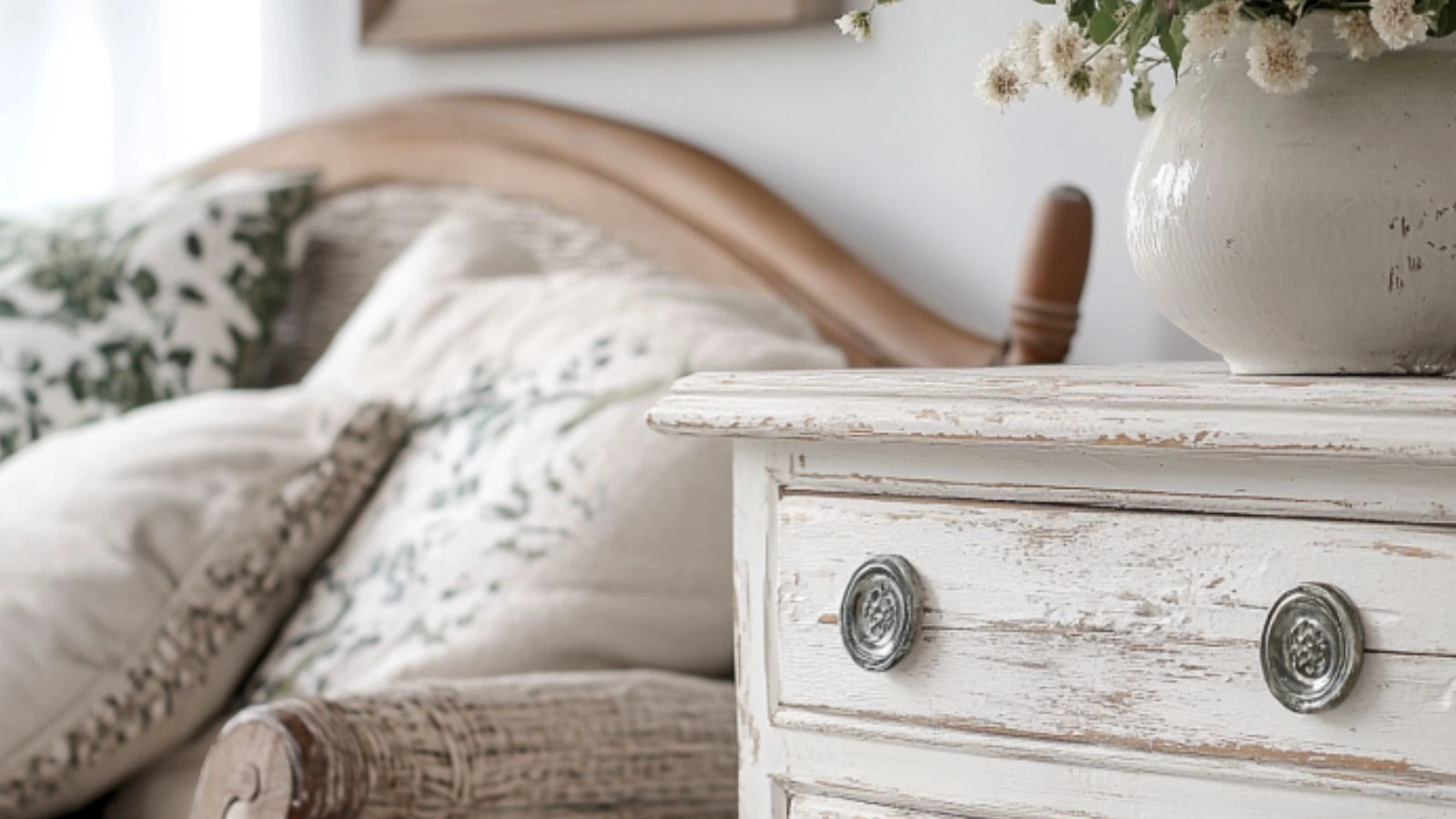Transform Your Space: DIY Vintage Cottage Living Room Styling Tips
Table of Contents
There’s something effortlessly inviting about a cottage-style living room. Think timeworn textures, floral prints, cozy corners, and charming imperfections that give a room its soul. In an age of fast furniture and minimalist trends, more homeowners are leaning into the nostalgic comfort of vintage cottage aesthetics. It’s a look that celebrates slow living and storytelling through decor.
Whether you’re working with a small space or an open-concept living room, bringing in that old-world cottage style doesn’t have to mean a total renovation. With a bit of creativity and weekend DIY motivation, you can craft a living room that feels cozy, romantic, and full of character.
This guide will walk you through smart, affordable DIY ideas to style your space with vintage cottage flair. From flea market finds to paint tricks, fabric swaps, and furniture upcycling, you’ll find a mix of practical steps and visual inspiration to start your transformation today.
Start with soft, layered textiles for warmth and texture
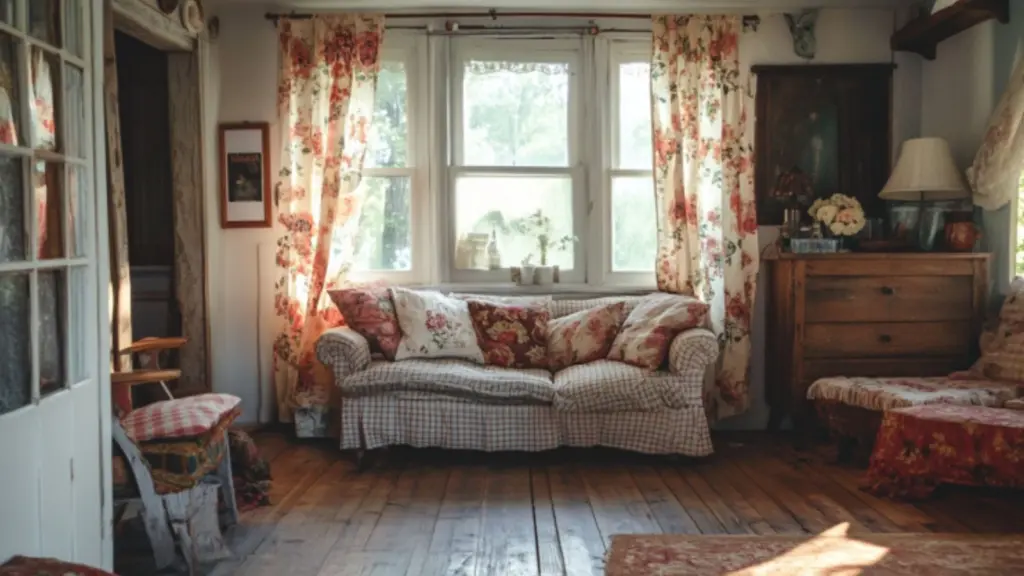
One of the most defining features of cottage living rooms is the presence of textiles—layered, cozy, and a little mismatched. Vintage style calls for soft cottons, washed linens, floral or gingham prints, and plenty of throws.
Layering textiles not only adds comfort but also helps set the tone for an eclectic, well-loved room. Use a variety of patterns and textures for interest—pair lace-edged linens with checkered pillows or faded tapestry throws with ruffled cushions.
Textile Styling Checklist
| Element | Material Suggestions | Vintage Touch |
|---|---|---|
| Curtains | Sheer linen, floral cotton | Tie with twine or ribbon |
| Throw pillows | Gingham, ticking stripe, lace | Mix sizes and trims |
| Rugs | Faded oriental, braided jute | Layer over hardwood |
| Throw blankets | Knit, crochet, or patchwork | Drape casually |
Repurpose old furniture with paint and charm
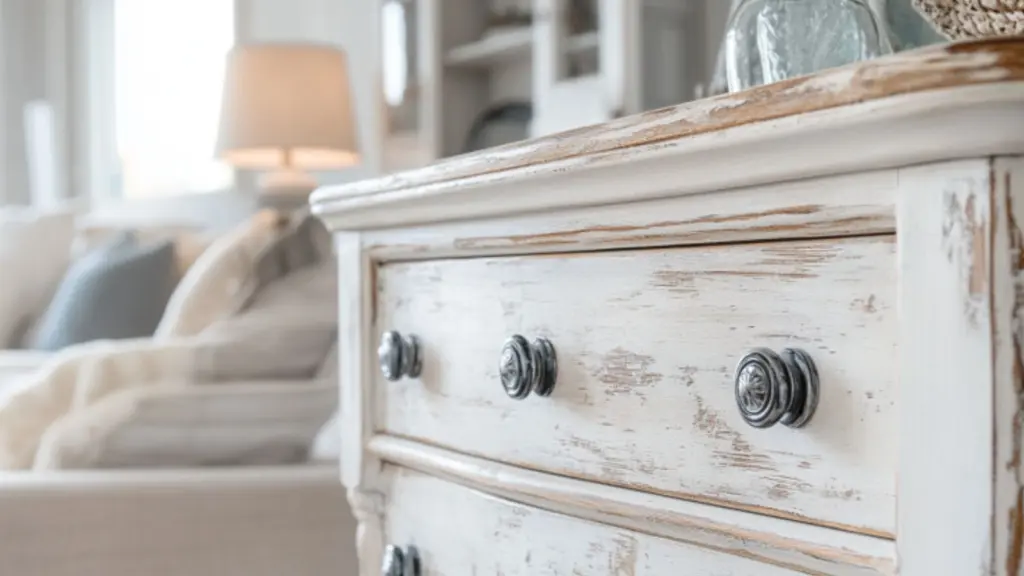
No need to buy new—vintage cottage living rooms embrace charm over perfection. Sand down a thrifted side table, repaint it in a distressed white or sage green, and let its imperfections shine. Open shelves, mismatched end tables, and vintage trunks all work well.
Distressing techniques like chalk paint finishes, dry brushing, or even leaving areas purposefully worn enhance the cottage appeal. Don’t overlook glass knobs, iron handles, or scalloped edges on old furniture—they’re perfect accents for this style.
Furniture DIY Ideas
| Item | DIY Upgrade | Cost Estimate |
|---|---|---|
| Old dresser | Paint, replace knobs with vintage ones | $20–$40 |
| Wooden coffee table | Sand, whitewash, add rattan tray top | $15–$35 |
| Bookshelf | Paint interior a contrasting soft pastel | $10–$25 |
Create a gallery wall with vintage frames and found art
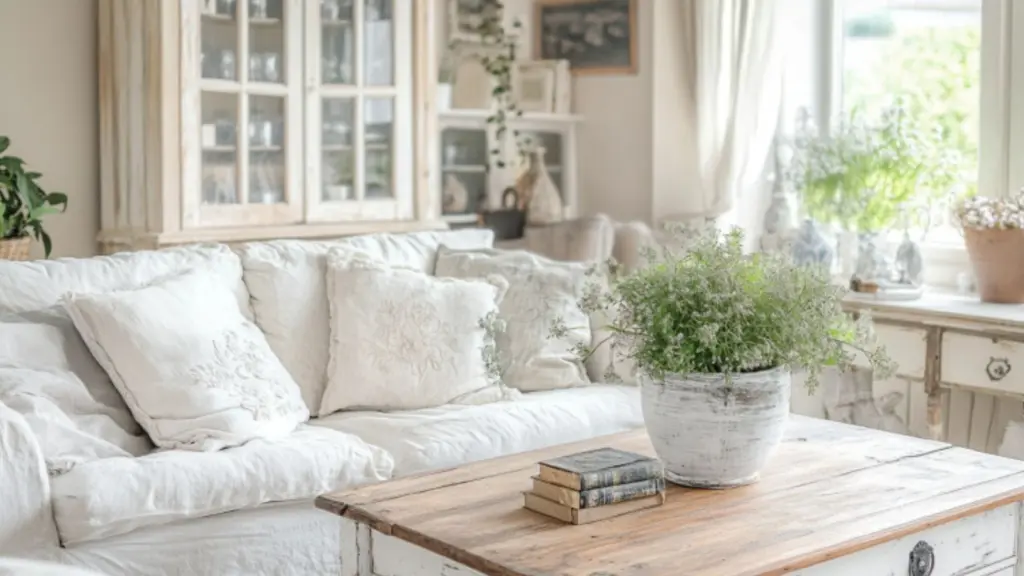
A curated gallery wall filled with flea market finds, old botanical prints, or your grandmother’s needlepoint adds storytelling to your walls. Mix vintage picture frames in different sizes and finishes, such as brass, distressed white, or wood.
To keep it cohesive, stick to a soft color palette—sepia tones, pastels, and neutral backdrops work well. Add in one or two ornate mirrors or small shelves for extra charm.
Step-by-Step Gallery Wall Setup
| Step | Task | Tip |
|---|---|---|
| 1 | Lay out frames on the floor | Use kraft paper to map layout |
| 2 | Choose anchor piece (mirror or large art) | Center it in the arrangement |
| 3 | Mix vertical and horizontal pieces | Balance visually |
| 4 | Hang with command strips or small nails | Keep damage minimal |
Incorporate natural materials for authenticity
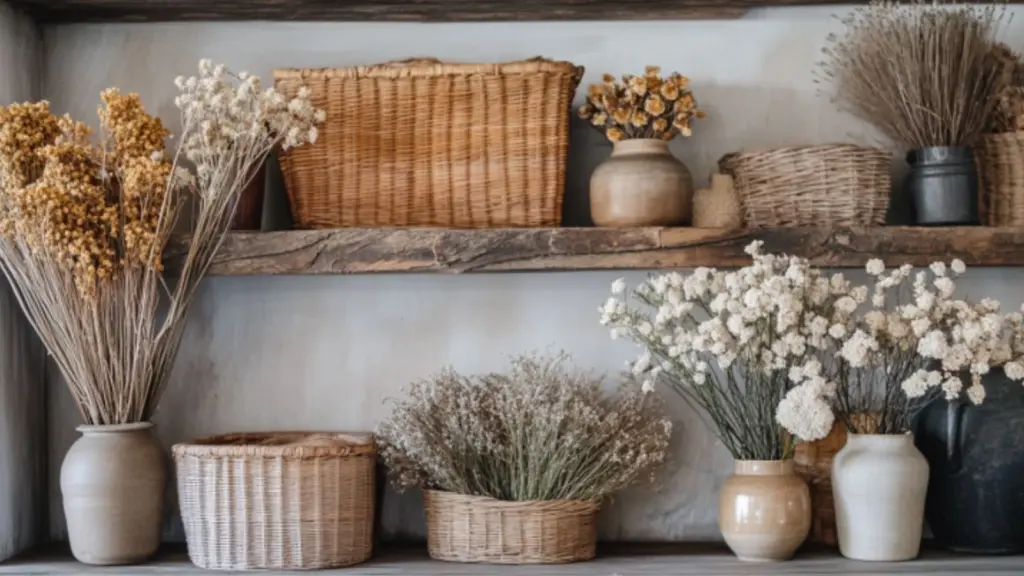
Vintage cottage style thrives on natural elements—weathered wood, stone, rattan, dried flowers, and even terracotta. These materials add texture and age to a space in a way that feels lived-in rather than staged.
You can incorporate natural elements with baskets, wood trays, exposed ceiling beams (real or faux), and even vintage wooden crates used as side tables or storage.
Common Cottage Materials and Uses
| Material | DIY Use | Bonus Tip |
|---|---|---|
| Rattan | Basket planters, trays | Line with linen for soft touch |
| Reclaimed wood | Floating shelves, mantels | Sand lightly but keep knots |
| Dried florals | Tabletop decor, wall hangings | Mix with greenery |
Use soft vintage lighting to create ambiance
Lighting plays a pivotal role in vintage cottage living rooms. Harsh overhead lighting is rarely seen—warmth and softness come from table lamps, sconces, and the glow of candles. To enhance this effect, choose lighting with character: ceramic bases, pleated shades, or antique brass finishes.
DIY-friendly options include swapping out shades on existing lamps or thrifting vintage bases and rewiring them. Battery-operated candles in hurricane jars or glass cloches can also add that lived-in, romantic vibe without the worry of open flames.
Lighting Options to Consider
| Type | Description | DIY Tip |
|---|---|---|
| Table lamps | Ceramic or turned wood bases | Change fabric shades |
| Wall sconces | Iron, brass, or distressed finishes | Use stick-on faux fixtures |
| Candles | Glass jars, candelabras | Use LED candles for safety |
Vintage cottage design thrives on creating a mood. A reading nook glows under a floral lampshade, while a fireplace mantle is lit by flickering votives. These small moments of ambiance turn a room into a retreat.
Add character with curated vintage accessories
Accessories are the finishing touch that makes a room feel like home. In a vintage cottage living room, think clocks, books, ceramic pitchers, lace doilies, or old suitcases stacked as tables.
Instead of clutter, the goal is curated charm. Stick to a neutral palette with pops of muted colors—sage, blush, cornflower blue. Use vintage books with faded covers to create height in displays, and stack dishes or teacups in open cabinets.
Accessory Styling Guide
| Item | Placement Idea | Vintage Accent Tip |
|---|---|---|
| Old books | Coffee table or mantle stack | Tie with twine |
| Pitchers or vases | Filled with seasonal flowers | Use as centerpiece or shelf decor |
| Framed doilies | Hang in a shadowbox | Pair with antique silver items |
These pieces invite conversation and nostalgia without overwhelming the space. It’s all about finding beauty in the past and making it feel timeless.
Conclusion
Designing a vintage cottage-style living room doesn’t require a huge budget or a professional stylist—it just takes intention, a little elbow grease, and a love for cozy, charming details. Whether you’re repurposing furniture, layering soft fabrics, or curating nostalgic accessories, each piece adds to a space that feels welcoming and full of soul.
By focusing on texture, history, and warmth, your DIY efforts will transform your space into a retreat where comfort and timeless beauty meet. And in the end, that’s what cottage living is all about—creating a home that feels lovingly lived in and endlessly cozy.

